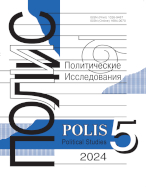Fundamentalism within the Dimensions of the Modern World
Kudryashova I.V.,
Cand. Sci. (Polit. Sci.), Associate Professor at Comparative Politics Department, MGIMO University, i.kudryashova@inno.mgimo.ru
elibrary_id: 626828 | ORCID: 0000-0003-1842-4672 |
DOI: 10.17976/jpps/2002.01.06
Kudryashova I.V. Fundamentalism within the Dimensions of the Modern World . – Polis. Political Studies. 2002. No. 1. https://doi.org/10.17976/jpps/2002.01.06
The issue discussed in the article is: Return of the religious factor into politics. Analytically, though curtly, observing, to begin with, different varieties of contemporary fundamentalism, it is to the Islamic one, the one generally recognized the most significant today and generally taken with most interest, that the author devotes the great bulk of her article. I.V.Kudryashova leaves political extremism out of the scope of the study and concentrates exclusively on legal fundamentalism whose ability to withstand modernity and at the same time to integrate into modernity, as the author concludes, allows to reckon it as an element of national development. But it is only within new world outlook, provided the world is taken as an integral system that one can perceive the scale, range and scope of that function of legal fundamentalism.
 Full Text (электронная версия)
Full Text (электронная версия)See also:
Melville A.Yu.,
On Trajectories of Post-Communist Transformations. – Polis. Political Studies. 2004. No2
Vorozheykina T.Ye.,
State and Society in Russia: the State-Centric Development Mould Exhausted. – Polis. Political Studies. 2002. No4
Bube M.,
The Role of Parties in the Formation of Political System of Post-War Germany. – Polis. Political Studies. 2004. No6
Kazantzev A.A.,
Intelligentsia and Structural Innovations in Political Expanse (An Essay of Comparative Analysis). – Polis. Political Studies. 2007. No1
Sergeev V.M.,
How Are Social Changes Possible? (Prolegomena to a Statistical Theory of Social Networks). – Polis. Political Studies. 2001. No6





.jpg)






 print
print.jpg)
.jpg)